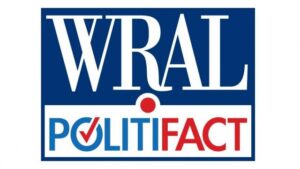 As the hotly contested 2020 election season nears, our country and our state appear more divided than ever.
As the hotly contested 2020 election season nears, our country and our state appear more divided than ever.
While the political left and right seem to disagree over truth itself, WRAL is committed to cutting through the noise and bringing you facts.
WRAL is now the official partner in North Carolina of PolitiFact, the Pulitzer Prize winning organization that fact checks the accuracy of claims made by elected officials and others on its Truth-O-Meter scale.
Beginning this week, WRAL’s PolitiFact team will offer reports every weekday on the facts behind what politicians and pundits on both sides of the aisle are claiming.
What is PolitiFact?
PolitiFact was created more than ten years ago. The idea developed from an experience then-Washington correspondent Bill Adair had, when he reported what a politician said, even though it was clearly an exaggeration of the truth.
“And I didn’t fact-check it,” Adair said recently, sitting in his office at Duke University where he teaches and mentors young journalists. “And no one from my newspaper fact-checked it, and I felt guilty about that. And that moment kind of hung with me, and that’s ultimately what led to PolitiFact.”
 Out of that experience, Adair, now the Knight Professor of Journalism and Public Policy at the Sanford School for Public Policy at Duke, came up with the idea to research the claims politicians or pundits made, to talk to them and research the sources behind their statements to determine how true their claims were.
Out of that experience, Adair, now the Knight Professor of Journalism and Public Policy at the Sanford School for Public Policy at Duke, came up with the idea to research the claims politicians or pundits made, to talk to them and research the sources behind their statements to determine how true their claims were.
The model worked, and it’s become a national standard in impartial journalism.
“What is important about PolitiFact is not just that it’s not biased,” Adair said, “but that we show our work and that we show all of our sources.”
How does it work?
PolitiFact reporters focus on a single political claim or statement and aim to determine how factual it is. The process always starts with the source. The reporter reaches out to the person or organization to whom the statement is credited, to learn the source(s) of their claims. Then they work to independently verify the information in the claim.
After extensive research, a PolitiFact reporter rates the statement on the “Truth-o-Meter”— from true to false or, worse, “pants on fire”—a designation meaning a claim is so false it’s ridiculous.
But the process doesn’t happen in a vacuum with one person deciding on the rating.
“One thing I love about PolitiFact is that the format is very structured and it’s not up to me to decide what is or isn’t true,” said Paul Specht, WRAL’s PolitiFact reporter who has been covering local, state and national politics for years. “It’s up to me to go do the research and then it’s up to the research to tell us what is true.”
Once the reporter has come to his or her own conclusion, it’s presented to a three-judge chamber of trained editors who determine the final rating.
Why is PolitiFact important?
“In recent years it’s become more acceptable to use deception as a political strategy,” Specht said. “Maybe it was always that way, but it seems more obvious now.”
Bill Adair sums it up another way. “It’s about giving people important information in a democracy so they can make smarter decisions.”
WRAL is the only local television station in the country right now partnering with PolitiFact to produce regular fact-checking segments.
Thanks to WRAL.com for this capcom story & for these capcom graphics.